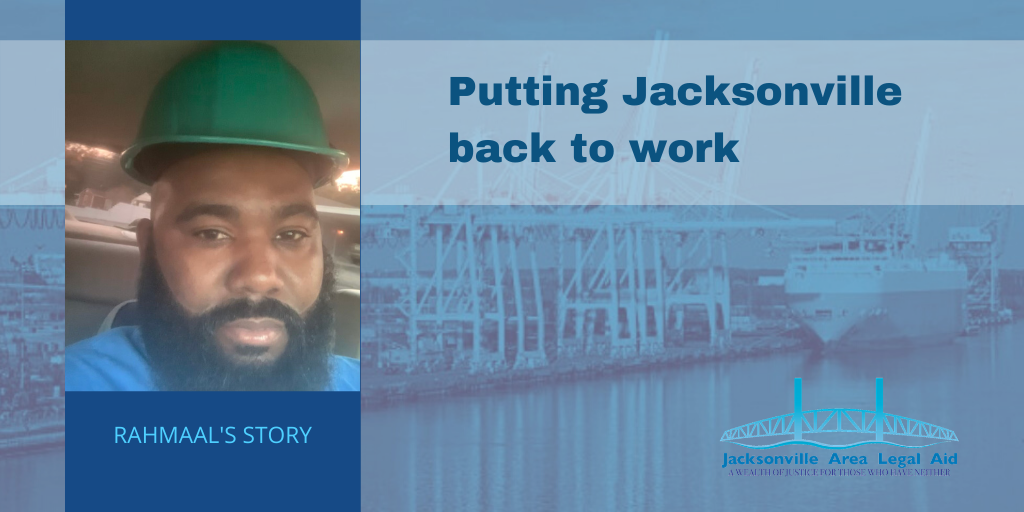
Rahmaal Fisher, 44, had been a longshoreman at Jacksonville’s port since he was 16, but after serving time in prison, he was barred from the job he loved because the Transportation Security Administration (TSA) would not issue him the required Transportation Worker Identification Card, or TWIC.
“Once I got sentenced to prison, I thought I had it arranged to where it wouldn’t affect my port pass,” Fisher said. “Once I got released, I saw that it had affected it. Because I applied with TSA for the TWIC pass, and they denied it. So, I had to apply again, and they denied it again.”
Being a longshoreman was the only work Fisher really knew, so he turned to Jacksonville Area Legal Aid, where a relative had once gotten help getting his card back, enabling him to return to work at the port.
Fisher spoke with attorney Jennifer Jerome, JALA’s Intake Director, who advised him to find other work and get involved in the community and to come back to her in six months.
“At that time, I did not feel we had enough to get a successful waiver, he had been released for only seven months,” Jerome said.
Fisher did just as Jerome advised. He began doing mobile automotive repair, fixing problems that did not require too much equipment. He was able to bring in some money, but it was not enough to live on in the long term. After six months, he returned to JALA to see Jerome.
“I advised him of the information I wanted him to gather from friends, employers, and his community supporting his rehabilitation and agreed to submit a request for a waiver on his behalf,” Jerome said. “I requested the information the TSA relied on in denying the TWIC and worked on preparing a package to submit to the TSA to show rehabilitation.”
Jerome submitted the waiver request in mid-December, and soon after Fisher was granted his TWIC.
“She coached me all the way through it. She did everything,” Fisher said of Jerome. “She was able to address the matter in detail, for what they were looking for to get the job done.”
Fisher was finally able to return to the work he had done since he was a First Coast High School student.
“I used to work down there in the summer, and then everything just took off from there,” said Fisher, who went to work full time at the port right after his high school graduation.
“It meant everything because it just makes life a whole lot easier when you have a passion for something, you’ve been doing it for a while, you understand it. It’s almost like it’s nothing like work when you have a love for the craft.”
After a month back at work at the port, Fisher had something he wanted Jerome to know.
“I just wanted to tell Jennifer thanks a whole lot, thanks a million, because the process probably wouldn’t have taken place if it wasn’t for her,” said Fisher, who plans to work at the port for the rest of his life.



